Fellow Doctor Resume Examples

Jul 18, 2024
|
12 min read
"Master the art of writing a fellow doctor resume: diagnose the key steps to highlight your skills, experience, and unique qualifications with precision, so you can prescribe your success in the competitive medical field."
Rated by 348 people
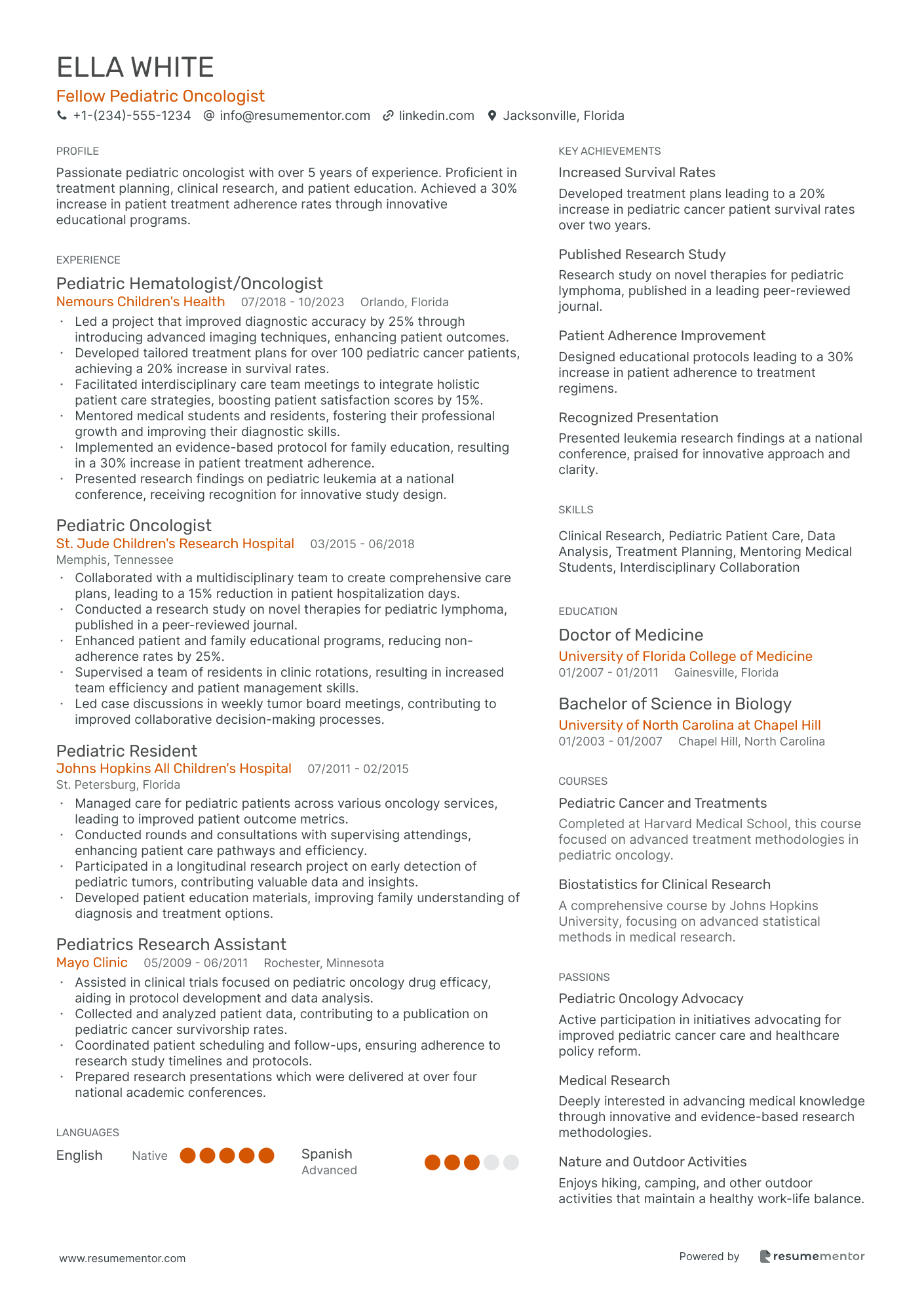
Fellow Pediatric Oncologist
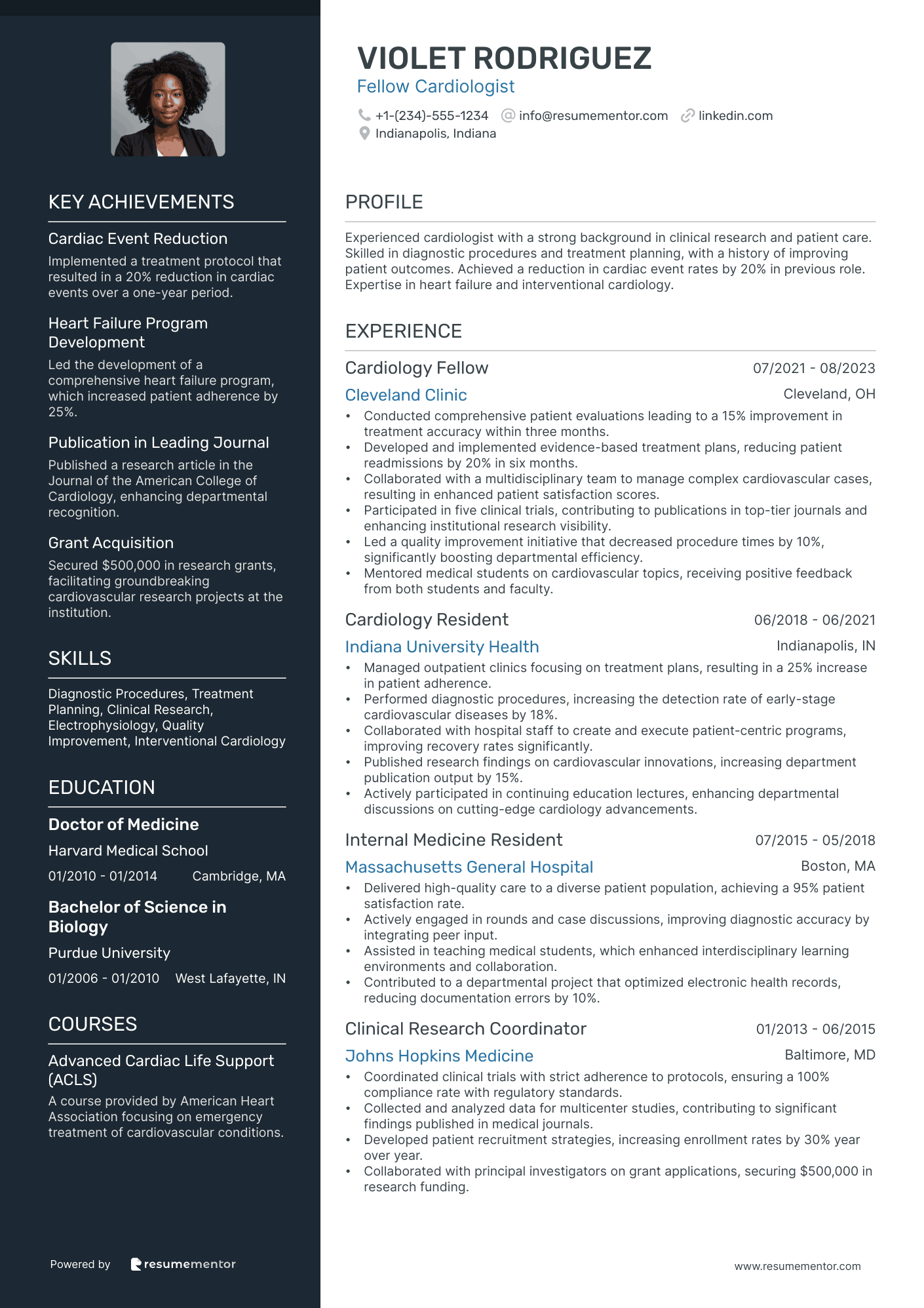
Fellow Cardiologist
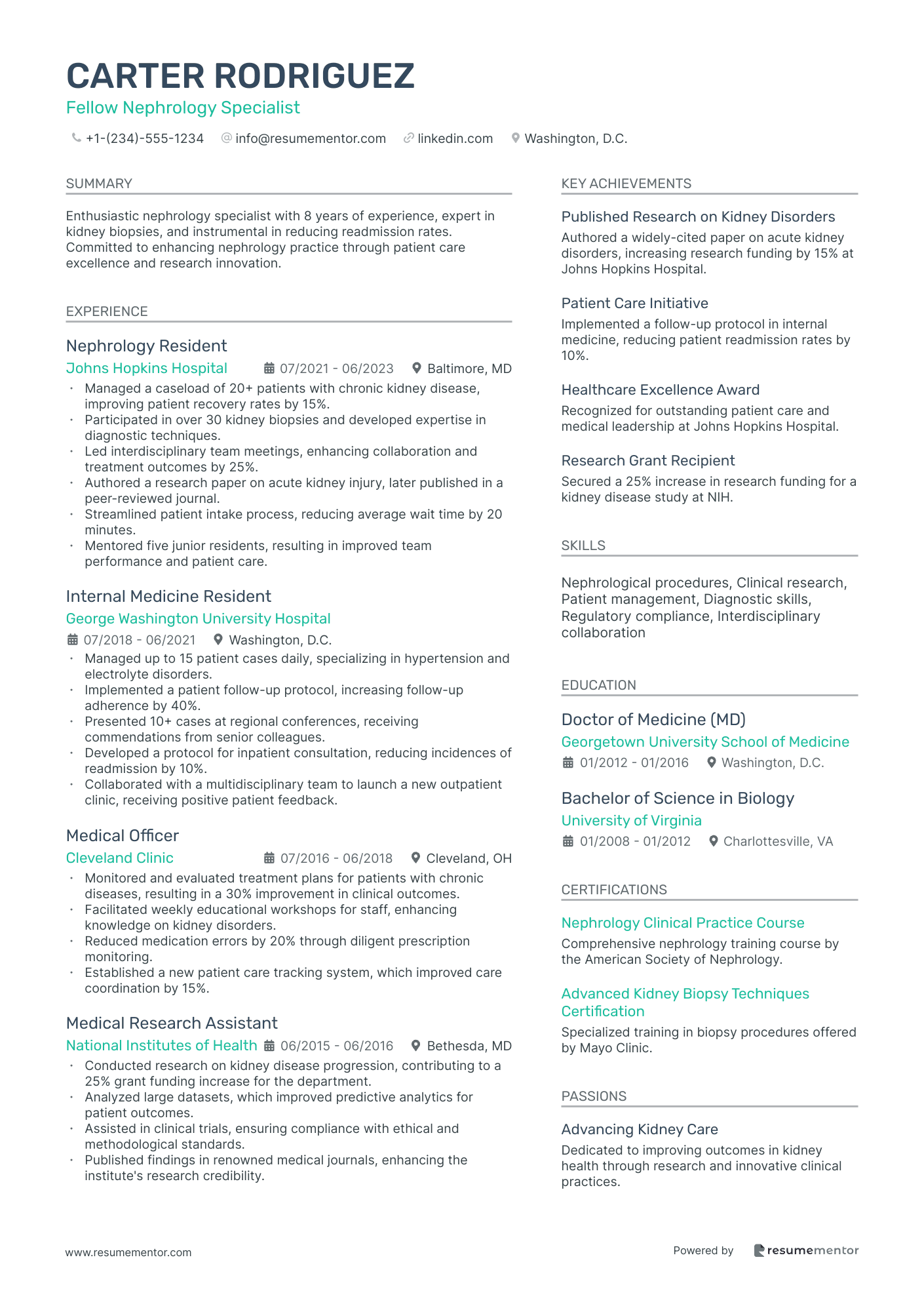
Fellow Nephrology Specialist
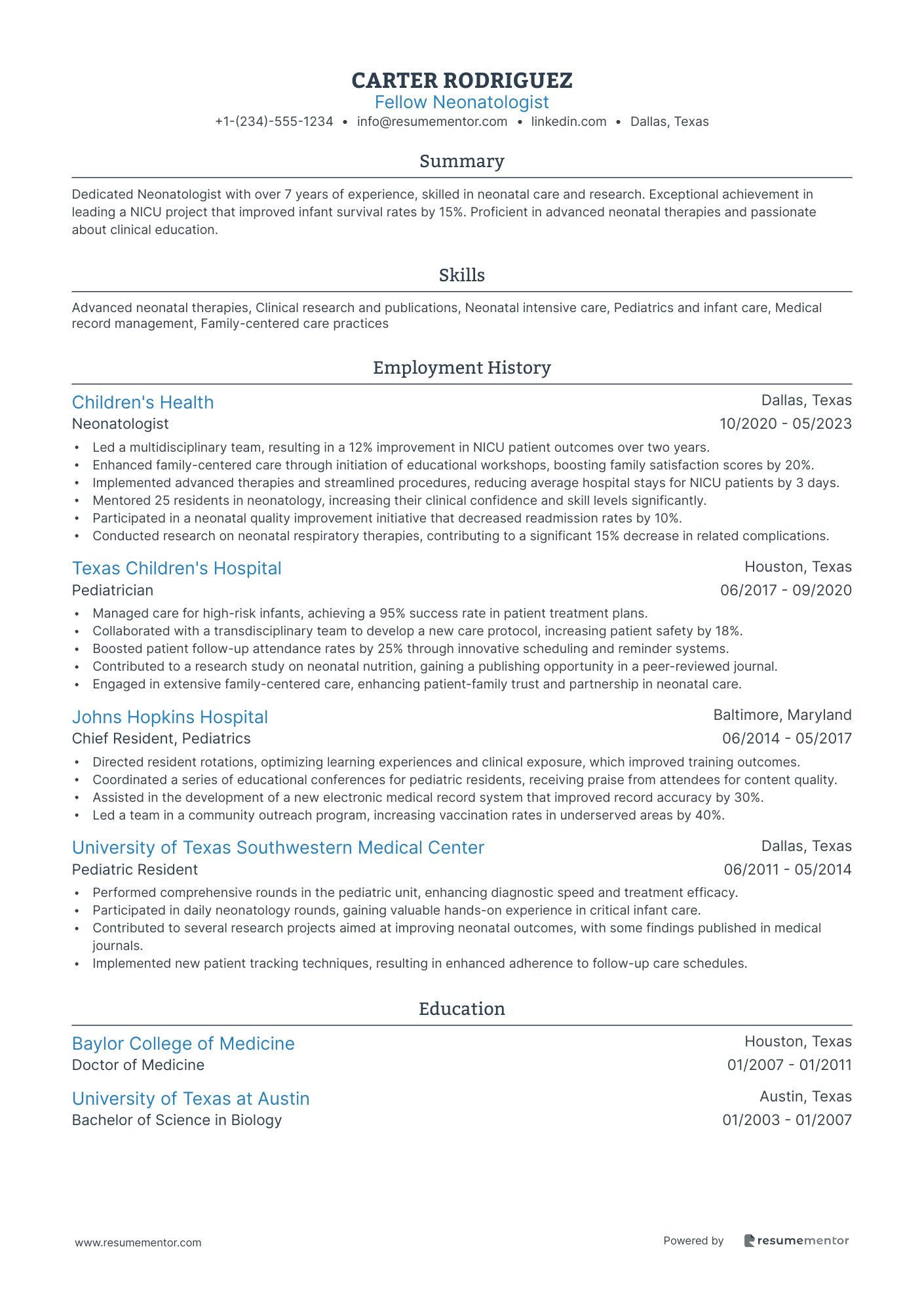
Fellow Neonatologist
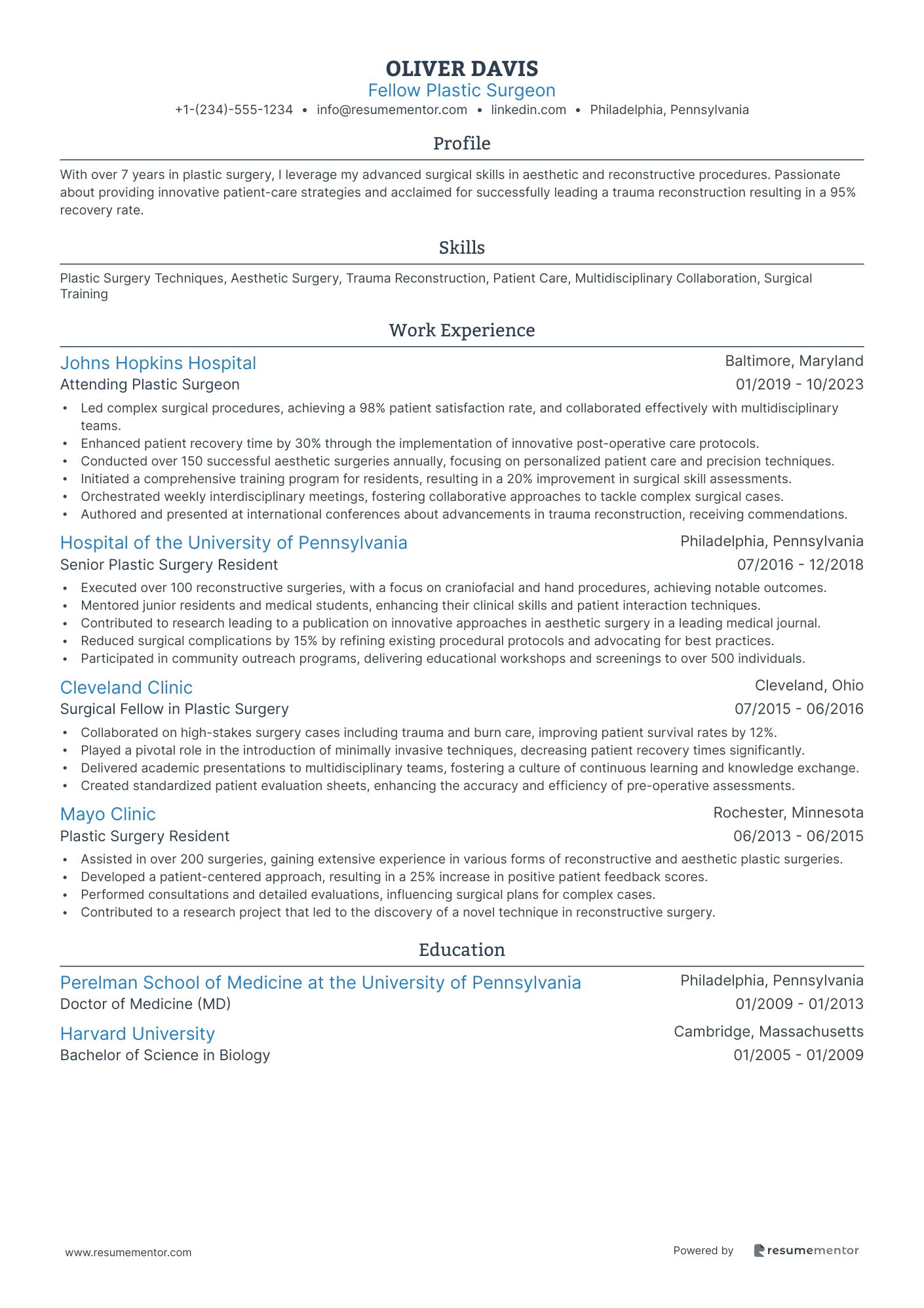
Fellow Plastic Surgeon
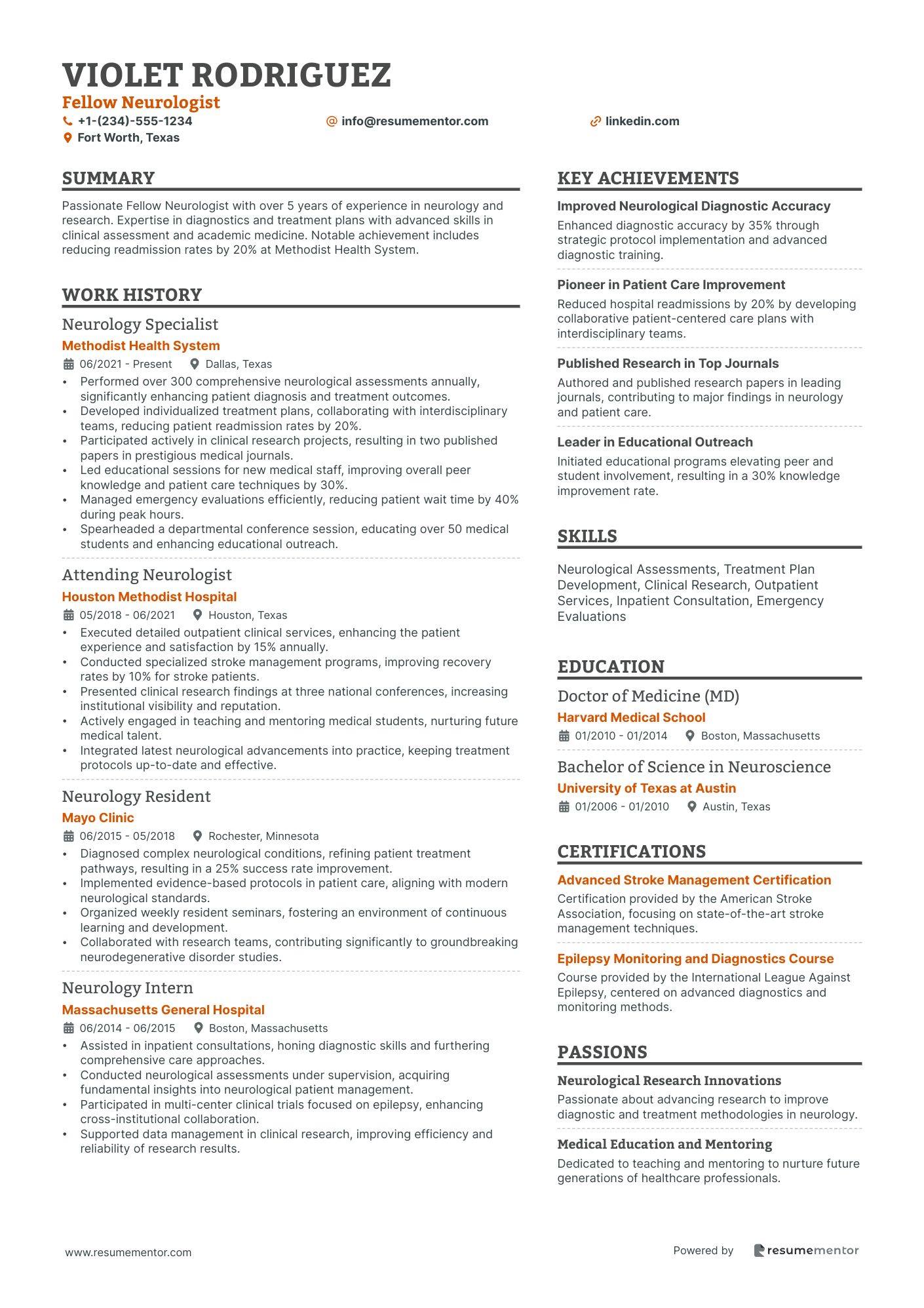
Fellow Neurologist
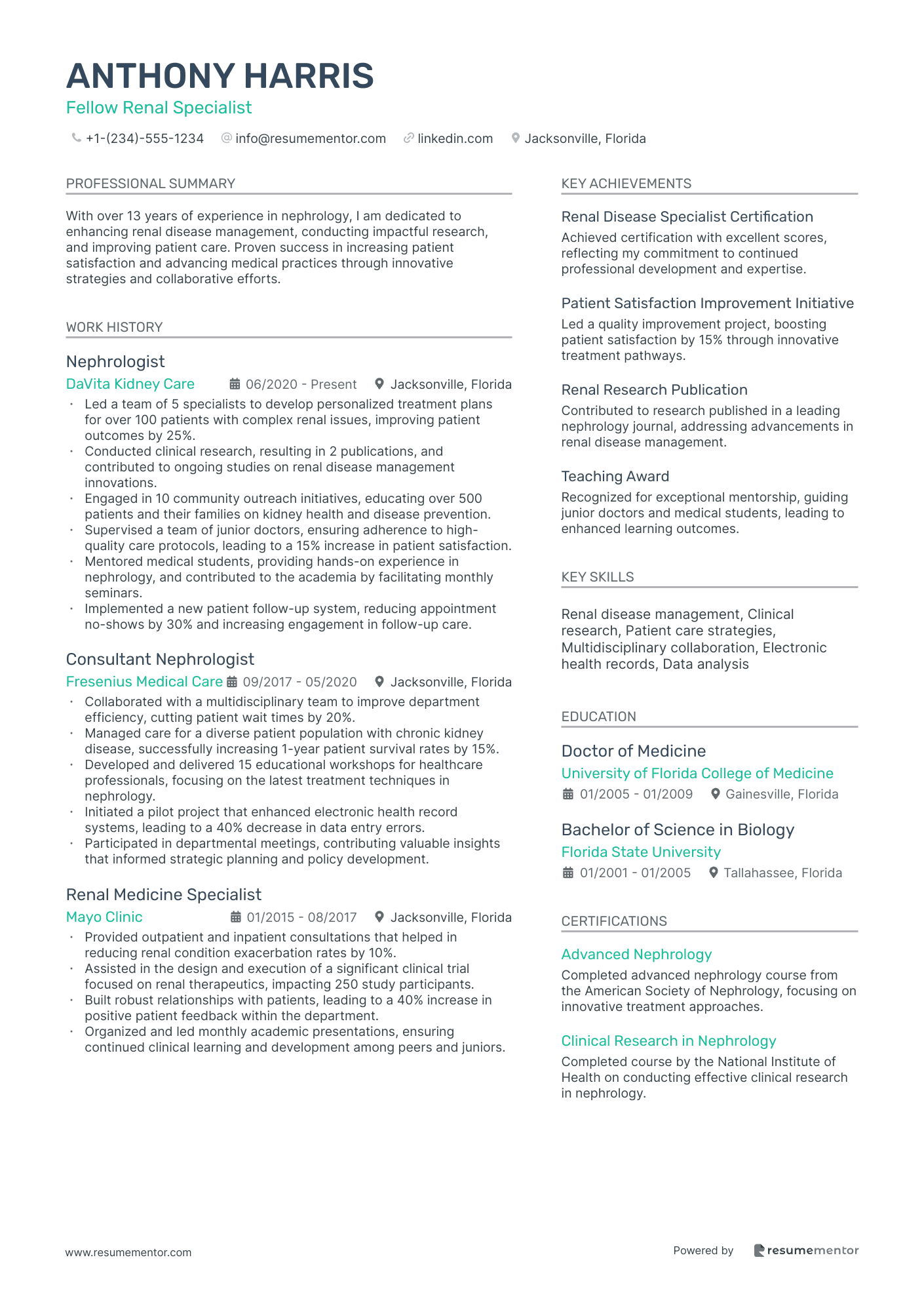
Fellow Renal Specialist
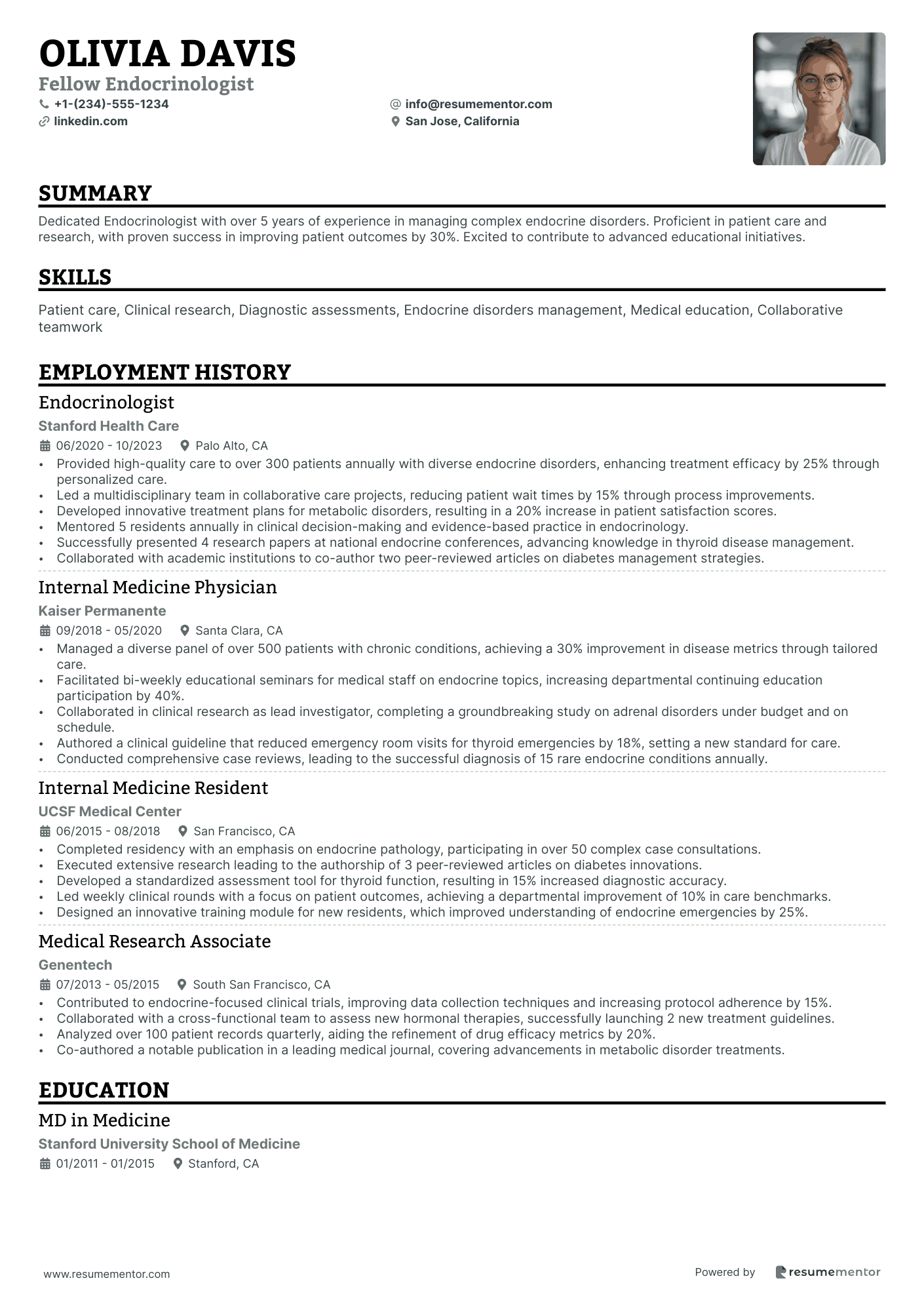
Fellow Endocrinologist
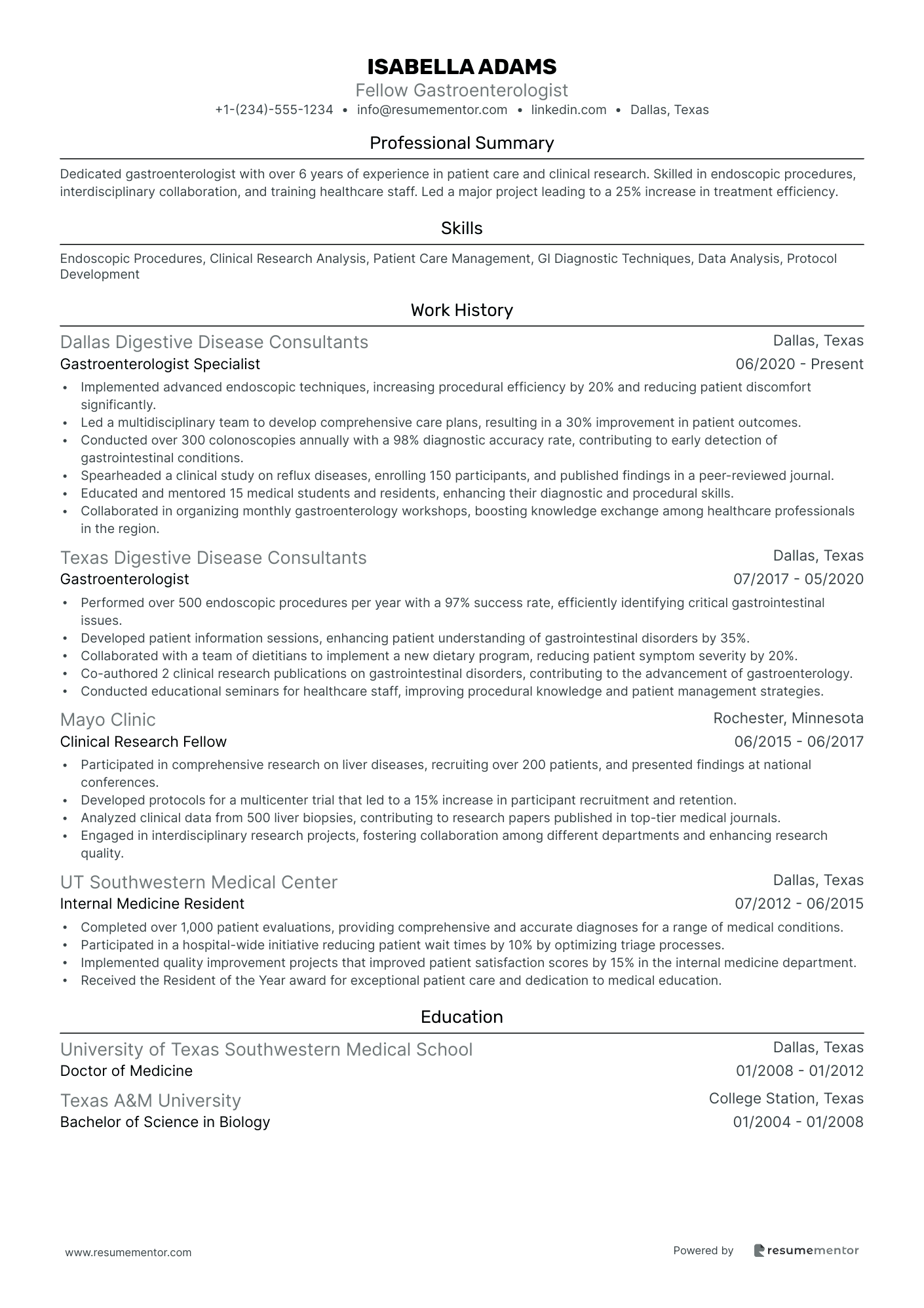
Fellow Gastroenterologist
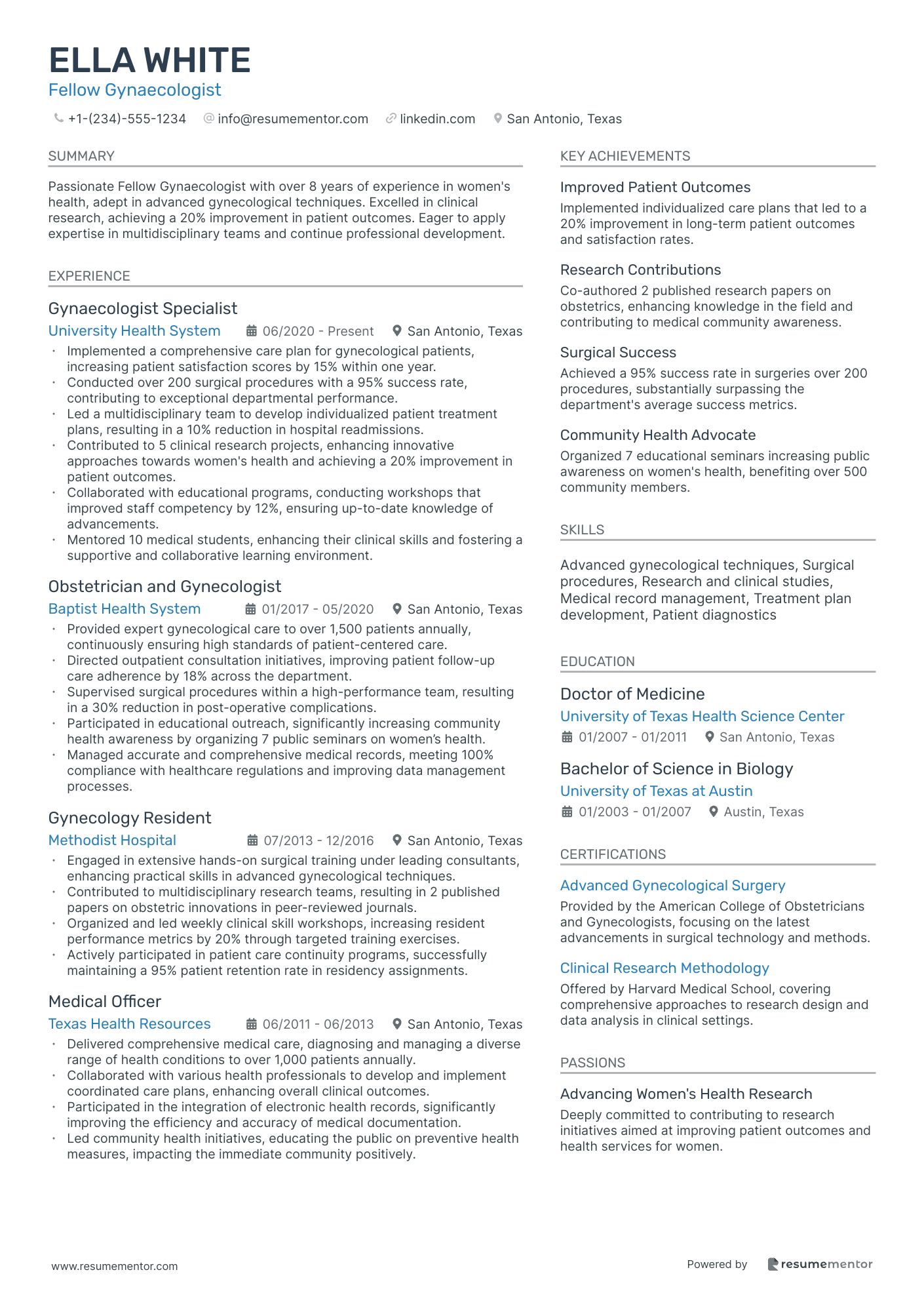
Fellow Gynaecologist

Fellow Pediatric Oncologist resume sample
- •Led a project that improved diagnostic accuracy by 25% through introducing advanced imaging techniques, enhancing patient outcomes.
- •Developed tailored treatment plans for over 100 pediatric cancer patients, achieving a 20% increase in survival rates.
- •Facilitated interdisciplinary care team meetings to integrate holistic patient care strategies, boosting patient satisfaction scores by 15%.
- •Mentored medical students and residents, fostering their professional growth and improving their diagnostic skills.
- •Implemented an evidence-based protocol for family education, resulting in a 30% increase in patient treatment adherence.
- •Presented research findings on pediatric leukemia at a national conference, receiving recognition for innovative study design.
- •Collaborated with a multidisciplinary team to create comprehensive care plans, leading to a 15% reduction in patient hospitalization days.
- •Conducted a research study on novel therapies for pediatric lymphoma, published in a peer-reviewed journal.
- •Enhanced patient and family educational programs, reducing non-adherence rates by 25%.
- •Supervised a team of residents in clinic rotations, resulting in increased team efficiency and patient management skills.
- •Led case discussions in weekly tumor board meetings, contributing to improved collaborative decision-making processes.
- •Managed care for pediatric patients across various oncology services, leading to improved patient outcome metrics.
- •Conducted rounds and consultations with supervising attendings, enhancing patient care pathways and efficiency.
- •Participated in a longitudinal research project on early detection of pediatric tumors, contributing valuable data and insights.
- •Developed patient education materials, improving family understanding of diagnosis and treatment options.
- •Assisted in clinical trials focused on pediatric oncology drug efficacy, aiding in protocol development and data analysis.
- •Collected and analyzed patient data, contributing to a publication on pediatric cancer survivorship rates.
- •Coordinated patient scheduling and follow-ups, ensuring adherence to research study timelines and protocols.
- •Prepared research presentations which were delivered at over four national academic conferences.
Fellow Cardiologist resume sample
- •Conducted comprehensive patient evaluations leading to a 15% improvement in treatment accuracy within three months.
- •Developed and implemented evidence-based treatment plans, reducing patient readmissions by 20% in six months.
- •Collaborated with a multidisciplinary team to manage complex cardiovascular cases, resulting in enhanced patient satisfaction scores.
- •Participated in five clinical trials, contributing to publications in top-tier journals and enhancing institutional research visibility.
- •Led a quality improvement initiative that decreased procedure times by 10%, significantly boosting departmental efficiency.
- •Mentored medical students on cardiovascular topics, receiving positive feedback from both students and faculty.
- •Managed outpatient clinics focusing on treatment plans, resulting in a 25% increase in patient adherence.
- •Performed diagnostic procedures, increasing the detection rate of early-stage cardiovascular diseases by 18%.
- •Collaborated with hospital staff to create and execute patient-centric programs, improving recovery rates significantly.
- •Published research findings on cardiovascular innovations, increasing department publication output by 15%.
- •Actively participated in continuing education lectures, enhancing departmental discussions on cutting-edge cardiology advancements.
- •Delivered high-quality care to a diverse patient population, achieving a 95% patient satisfaction rate.
- •Actively engaged in rounds and case discussions, improving diagnostic accuracy by integrating peer input.
- •Assisted in teaching medical students, which enhanced interdisciplinary learning environments and collaboration.
- •Contributed to a departmental project that optimized electronic health records, reducing documentation errors by 10%.
- •Coordinated clinical trials with strict adherence to protocols, ensuring a 100% compliance rate with regulatory standards.
- •Collected and analyzed data for multicenter studies, contributing to significant findings published in medical journals.
- •Developed patient recruitment strategies, increasing enrollment rates by 30% year over year.
- •Collaborated with principal investigators on grant applications, securing $500,000 in research funding.
Fellow Nephrology Specialist resume sample
- •Managed a caseload of 20+ patients with chronic kidney disease, improving patient recovery rates by 15%.
- •Participated in over 30 kidney biopsies and developed expertise in diagnostic techniques.
- •Led interdisciplinary team meetings, enhancing collaboration and treatment outcomes by 25%.
- •Authored a research paper on acute kidney injury, later published in a peer-reviewed journal.
- •Streamlined patient intake process, reducing average wait time by 20 minutes.
- •Mentored five junior residents, resulting in improved team performance and patient care.
- •Managed up to 15 patient cases daily, specializing in hypertension and electrolyte disorders.
- •Implemented a patient follow-up protocol, increasing follow-up adherence by 40%.
- •Presented 10+ cases at regional conferences, receiving commendations from senior colleagues.
- •Developed a protocol for inpatient consultation, reducing incidences of readmission by 10%.
- •Collaborated with a multidisciplinary team to launch a new outpatient clinic, receiving positive patient feedback.
- •Monitored and evaluated treatment plans for patients with chronic diseases, resulting in a 30% improvement in clinical outcomes.
- •Facilitated weekly educational workshops for staff, enhancing knowledge on kidney disorders.
- •Reduced medication errors by 20% through diligent prescription monitoring.
- •Established a new patient care tracking system, which improved care coordination by 15%.
- •Conducted research on kidney disease progression, contributing to a 25% grant funding increase for the department.
- •Analyzed large datasets, which improved predictive analytics for patient outcomes.
- •Assisted in clinical trials, ensuring compliance with ethical and methodological standards.
- •Published findings in renowned medical journals, enhancing the institute's research credibility.
Fellow Neonatologist resume sample
- •Led a multidisciplinary team, resulting in a 12% improvement in NICU patient outcomes over two years.
- •Enhanced family-centered care through initiation of educational workshops, boosting family satisfaction scores by 20%.
- •Implemented advanced therapies and streamlined procedures, reducing average hospital stays for NICU patients by 3 days.
- •Mentored 25 residents in neonatology, increasing their clinical confidence and skill levels significantly.
- •Participated in a neonatal quality improvement initiative that decreased readmission rates by 10%.
- •Conducted research on neonatal respiratory therapies, contributing to a significant 15% decrease in related complications.
- •Managed care for high-risk infants, achieving a 95% success rate in patient treatment plans.
- •Collaborated with a transdisciplinary team to develop a new care protocol, increasing patient safety by 18%.
- •Boosted patient follow-up attendance rates by 25% through innovative scheduling and reminder systems.
- •Contributed to a research study on neonatal nutrition, gaining a publishing opportunity in a peer-reviewed journal.
- •Engaged in extensive family-centered care, enhancing patient-family trust and partnership in neonatal care.
- •Directed resident rotations, optimizing learning experiences and clinical exposure, which improved training outcomes.
- •Coordinated a series of educational conferences for pediatric residents, receiving praise from attendees for content quality.
- •Assisted in the development of a new electronic medical record system that improved record accuracy by 30%.
- •Led a team in a community outreach program, increasing vaccination rates in underserved areas by 40%.
- •Performed comprehensive rounds in the pediatric unit, enhancing diagnostic speed and treatment efficacy.
- •Participated in daily neonatology rounds, gaining valuable hands-on experience in critical infant care.
- •Contributed to several research projects aimed at improving neonatal outcomes, with some findings published in medical journals.
- •Implemented new patient tracking techniques, resulting in enhanced adherence to follow-up care schedules.
Fellow Plastic Surgeon resume sample
- •Led complex surgical procedures, achieving a 98% patient satisfaction rate, and collaborated effectively with multidisciplinary teams.
- •Enhanced patient recovery time by 30% through the implementation of innovative post-operative care protocols.
- •Conducted over 150 successful aesthetic surgeries annually, focusing on personalized patient care and precision techniques.
- •Initiated a comprehensive training program for residents, resulting in a 20% improvement in surgical skill assessments.
- •Orchestrated weekly interdisciplinary meetings, fostering collaborative approaches to tackle complex surgical cases.
- •Authored and presented at international conferences about advancements in trauma reconstruction, receiving commendations.
- •Executed over 100 reconstructive surgeries, with a focus on craniofacial and hand procedures, achieving notable outcomes.
- •Mentored junior residents and medical students, enhancing their clinical skills and patient interaction techniques.
- •Contributed to research leading to a publication on innovative approaches in aesthetic surgery in a leading medical journal.
- •Reduced surgical complications by 15% by refining existing procedural protocols and advocating for best practices.
- •Participated in community outreach programs, delivering educational workshops and screenings to over 500 individuals.
- •Collaborated on high-stakes surgery cases including trauma and burn care, improving patient survival rates by 12%.
- •Played a pivotal role in the introduction of minimally invasive techniques, decreasing patient recovery times significantly.
- •Delivered academic presentations to multidisciplinary teams, fostering a culture of continuous learning and knowledge exchange.
- •Created standardized patient evaluation sheets, enhancing the accuracy and efficiency of pre-operative assessments.
- •Assisted in over 200 surgeries, gaining extensive experience in various forms of reconstructive and aesthetic plastic surgeries.
- •Developed a patient-centered approach, resulting in a 25% increase in positive patient feedback scores.
- •Performed consultations and detailed evaluations, influencing surgical plans for complex cases.
- •Contributed to a research project that led to the discovery of a novel technique in reconstructive surgery.
Fellow Neurologist resume sample
- •Performed over 300 comprehensive neurological assessments annually, significantly enhancing patient diagnosis and treatment outcomes.
- •Developed individualized treatment plans, collaborating with interdisciplinary teams, reducing patient readmission rates by 20%.
- •Participated actively in clinical research projects, resulting in two published papers in prestigious medical journals.
- •Led educational sessions for new medical staff, improving overall peer knowledge and patient care techniques by 30%.
- •Managed emergency evaluations efficiently, reducing patient wait time by 40% during peak hours.
- •Spearheaded a departmental conference session, educating over 50 medical students and enhancing educational outreach.
- •Executed detailed outpatient clinical services, enhancing the patient experience and satisfaction by 15% annually.
- •Conducted specialized stroke management programs, improving recovery rates by 10% for stroke patients.
- •Presented clinical research findings at three national conferences, increasing institutional visibility and reputation.
- •Actively engaged in teaching and mentoring medical students, nurturing future medical talent.
- •Integrated latest neurological advancements into practice, keeping treatment protocols up-to-date and effective.
- •Diagnosed complex neurological conditions, refining patient treatment pathways, resulting in a 25% success rate improvement.
- •Implemented evidence-based protocols in patient care, aligning with modern neurological standards.
- •Organized weekly resident seminars, fostering an environment of continuous learning and development.
- •Collaborated with research teams, contributing significantly to groundbreaking neurodegenerative disorder studies.
- •Assisted in inpatient consultations, honing diagnostic skills and furthering comprehensive care approaches.
- •Conducted neurological assessments under supervision, acquiring fundamental insights into neurological patient management.
- •Participated in multi-center clinical trials focused on epilepsy, enhancing cross-institutional collaboration.
- •Supported data management in clinical research, improving efficiency and reliability of research results.
Fellow Renal Specialist resume sample
- •Led a team of 5 specialists to develop personalized treatment plans for over 100 patients with complex renal issues, improving patient outcomes by 25%.
- •Conducted clinical research, resulting in 2 publications, and contributed to ongoing studies on renal disease management innovations.
- •Engaged in 10 community outreach initiatives, educating over 500 patients and their families on kidney health and disease prevention.
- •Supervised a team of junior doctors, ensuring adherence to high-quality care protocols, leading to a 15% increase in patient satisfaction.
- •Mentored medical students, providing hands-on experience in nephrology, and contributed to the academia by facilitating monthly seminars.
- •Implemented a new patient follow-up system, reducing appointment no-shows by 30% and increasing engagement in follow-up care.
- •Collaborated with a multidisciplinary team to improve department efficiency, cutting patient wait times by 20%.
- •Managed care for a diverse patient population with chronic kidney disease, successfully increasing 1-year patient survival rates by 15%.
- •Developed and delivered 15 educational workshops for healthcare professionals, focusing on the latest treatment techniques in nephrology.
- •Initiated a pilot project that enhanced electronic health record systems, leading to a 40% decrease in data entry errors.
- •Participated in departmental meetings, contributing valuable insights that informed strategic planning and policy development.
- •Provided outpatient and inpatient consultations that helped in reducing renal condition exacerbation rates by 10%.
- •Assisted in the design and execution of a significant clinical trial focused on renal therapeutics, impacting 250 study participants.
- •Built robust relationships with patients, leading to a 40% increase in positive patient feedback within the department.
- •Organized and led monthly academic presentations, ensuring continued clinical learning and development among peers and juniors.
- •Successfully managed over 200 cases of chronic diseases, improving overall patient health metrics significantly over a 3-year period.
- •Pioneered an interdisciplinary approach for holistic patient care, leading to a 25% improvement in patient health outcomes.
- •Conducted patient assessments and developed individualized treatment plans, reducing treatment time by 15%.
- •Educated patients and their families on managing internal medicine-related health issues, enhancing patient education and empowerment.
Fellow Endocrinologist resume sample
- •Provided high-quality care to over 300 patients annually with diverse endocrine disorders, enhancing treatment efficacy by 25% through personalized care.
- •Led a multidisciplinary team in collaborative care projects, reducing patient wait times by 15% through process improvements.
- •Developed innovative treatment plans for metabolic disorders, resulting in a 20% increase in patient satisfaction scores.
- •Mentored 5 residents annually in clinical decision-making and evidence-based practice in endocrinology.
- •Successfully presented 4 research papers at national endocrine conferences, advancing knowledge in thyroid disease management.
- •Collaborated with academic institutions to co-author two peer-reviewed articles on diabetes management strategies.
- •Managed a diverse panel of over 500 patients with chronic conditions, achieving a 30% improvement in disease metrics through tailored care.
- •Facilitated bi-weekly educational seminars for medical staff on endocrine topics, increasing departmental continuing education participation by 40%.
- •Collaborated in clinical research as lead investigator, completing a groundbreaking study on adrenal disorders under budget and on schedule.
- •Authored a clinical guideline that reduced emergency room visits for thyroid emergencies by 18%, setting a new standard for care.
- •Conducted comprehensive case reviews, leading to the successful diagnosis of 15 rare endocrine conditions annually.
- •Completed residency with an emphasis on endocrine pathology, participating in over 50 complex case consultations.
- •Executed extensive research leading to the authorship of 3 peer-reviewed articles on diabetes innovations.
- •Developed a standardized assessment tool for thyroid function, resulting in 15% increased diagnostic accuracy.
- •Led weekly clinical rounds with a focus on patient outcomes, achieving a departmental improvement of 10% in care benchmarks.
- •Designed an innovative training module for new residents, which improved understanding of endocrine emergencies by 25%.
- •Contributed to endocrine-focused clinical trials, improving data collection techniques and increasing protocol adherence by 15%.
- •Collaborated with a cross-functional team to assess new hormonal therapies, successfully launching 2 new treatment guidelines.
- •Analyzed over 100 patient records quarterly, aiding the refinement of drug efficacy metrics by 20%.
- •Co-authored a notable publication in a leading medical journal, covering advancements in metabolic disorder treatments.
Fellow Gastroenterologist resume sample
- •Implemented advanced endoscopic techniques, increasing procedural efficiency by 20% and reducing patient discomfort significantly.
- •Led a multidisciplinary team to develop comprehensive care plans, resulting in a 30% improvement in patient outcomes.
- •Conducted over 300 colonoscopies annually with a 98% diagnostic accuracy rate, contributing to early detection of gastrointestinal conditions.
- •Spearheaded a clinical study on reflux diseases, enrolling 150 participants, and published findings in a peer-reviewed journal.
- •Educated and mentored 15 medical students and residents, enhancing their diagnostic and procedural skills.
- •Collaborated in organizing monthly gastroenterology workshops, boosting knowledge exchange among healthcare professionals in the region.
- •Performed over 500 endoscopic procedures per year with a 97% success rate, efficiently identifying critical gastrointestinal issues.
- •Developed patient information sessions, enhancing patient understanding of gastrointestinal disorders by 35%.
- •Collaborated with a team of dietitians to implement a new dietary program, reducing patient symptom severity by 20%.
- •Co-authored 2 clinical research publications on gastrointestinal disorders, contributing to the advancement of gastroenterology.
- •Conducted educational seminars for healthcare staff, improving procedural knowledge and patient management strategies.
- •Participated in comprehensive research on liver diseases, recruiting over 200 patients, and presented findings at national conferences.
- •Developed protocols for a multicenter trial that led to a 15% increase in participant recruitment and retention.
- •Analyzed clinical data from 500 liver biopsies, contributing to research papers published in top-tier medical journals.
- •Engaged in interdisciplinary research projects, fostering collaboration among different departments and enhancing research quality.
- •Completed over 1,000 patient evaluations, providing comprehensive and accurate diagnoses for a range of medical conditions.
- •Participated in a hospital-wide initiative reducing patient wait times by 10% by optimizing triage processes.
- •Implemented quality improvement projects that improved patient satisfaction scores by 15% in the internal medicine department.
- •Received the Resident of the Year award for exceptional patient care and dedication to medical education.
Fellow Gynaecologist resume sample
- •Implemented a comprehensive care plan for gynecological patients, increasing patient satisfaction scores by 15% within one year.
- •Conducted over 200 surgical procedures with a 95% success rate, contributing to exceptional departmental performance.
- •Led a multidisciplinary team to develop individualized patient treatment plans, resulting in a 10% reduction in hospital readmissions.
- •Contributed to 5 clinical research projects, enhancing innovative approaches towards women's health and achieving a 20% improvement in patient outcomes.
- •Collaborated with educational programs, conducting workshops that improved staff competency by 12%, ensuring up-to-date knowledge of advancements.
- •Mentored 10 medical students, enhancing their clinical skills and fostering a supportive and collaborative learning environment.
- •Provided expert gynecological care to over 1,500 patients annually, continuously ensuring high standards of patient-centered care.
- •Directed outpatient consultation initiatives, improving patient follow-up care adherence by 18% across the department.
- •Supervised surgical procedures within a high-performance team, resulting in a 30% reduction in post-operative complications.
- •Participated in educational outreach, significantly increasing community health awareness by organizing 7 public seminars on women’s health.
- •Managed accurate and comprehensive medical records, meeting 100% compliance with healthcare regulations and improving data management processes.
- •Engaged in extensive hands-on surgical training under leading consultants, enhancing practical skills in advanced gynecological techniques.
- •Contributed to multidisciplinary research teams, resulting in 2 published papers on obstetric innovations in peer-reviewed journals.
- •Organized and led weekly clinical skill workshops, increasing resident performance metrics by 20% through targeted training exercises.
- •Actively participated in patient care continuity programs, successfully maintaining a 95% patient retention rate in residency assignments.
- •Delivered comprehensive medical care, diagnosing and managing a diverse range of health conditions to over 1,000 patients annually.
- •Collaborated with various health professionals to develop and implement coordinated care plans, enhancing overall clinical outcomes.
- •Participated in the integration of electronic health records, significantly improving the efficiency and accuracy of medical documentation.
- •Led community health initiatives, educating the public on preventive health measures, impacting the immediate community positively.
Navigating the journey from medical school to a rewarding career as a fellow doctor involves more than just honing clinical skills—it requires a standout resume. Capturing your comprehensive medical expertise, research credits, and patient care experiences on paper can feel as tricky as diagnosing a mysterious ailment, leaving you unsure how to begin.
Feeling more at home with patient charts than resume design is common, and missteps in organization or clarity can hide your professional value. Here, a good resume template becomes your ally, offering structure so you can showcase your strengths without the hassle of starting from scratch.
In a competitive field like medicine, where every detail matters, your resume needs to reflect the precision and care you bring to your practice. Clearly conveying your achievements and skills mirrors the way you handle patient care, ensuring hiring committees see your full potential.
Your medical expertise is your greatest asset, and it deserves to be front and center. Crafting a resume that communicates as effectively as you do with your peers is crucial. This guide will help you transform your skills and experiences into a compelling narrative that commands attention and gets noticed.
Key Takeaways
- A standout resume is crucial in the medical field, reflecting your medical expertise, research contributions, and patient care experiences.
- The resume should start with contact information, followed by a professional summary, education, clinical experience, research publications, and certifications.
- Reverse-chronological format is recommended, with modern fonts like Rubik, Lato, and Montserrat, and saving the resume as a PDF ensures consistent formatting across devices.
- The experience section should highlight quantifiable achievements, aligning with job descriptions, and use strong action verbs.
- Emphasizing both hard skills like surgical techniques and soft skills such as communication is essential for standing out to recruiters and ATS systems.
What to focus on when writing your fellow doctor resume
A fellow doctor resume should convey your medical expertise and dedication to advancing in the field. It highlights not only your clinical experience but also your research contributions and your commitment to continuous learning.
How to structure your fellow doctor resume
- Contact Information: Start with your full name, phone number, professional email, and LinkedIn URL to make it easy for recruiters to reach you. Including your address is optional but can be useful—ensure your contact details are up-to-date so there's no hindrance in communication.
- Professional Summary: This section should be a powerful introduction that captures your most notable achievements and areas of specialization. By emphasizing your clinical skills and expertise, you set the stage for what follows—this brief narrative offers a snapshot of what you bring to the table and sparks interest for closer scrutiny of the details ahead.
- Education: Building on your expertise, list your medical degrees, such as your Doctor of Medicine (MD). Mention the schools, graduation dates, and any honors to underscore your academic background and highlight the depth of your medical training—educational achievements provide a foundation, lending credibility to your practical experiences detailed later.
- Clinical Experience: Next, provide details of your roles during residency or fellowship. Highlight the facility’s name and your key contributions or skills developed, demonstrating your hands-on experience—this section showcases how your theoretical knowledge has been applied in real-world settings, preparing you thoroughly for future challenges.
- Research and Publications: To further illustrate your dedication, share any research work or publications you’ve been involved in. Focus on contributions to medical journals that relate directly to your specialty—highlighting your involvement in research projects shows a commitment to advancing medical knowledge and contributes positively to your field.
- Certifications and Licenses: Finally, round out your qualifications by listing your medical licenses and board certifications. Include the issuing organizations and expiration dates to complete the picture of your professional preparedness—these credentials attest to your qualifications and your adherence to the standards of the medical profession. Below, we'll cover each section more in-depth as we explore resume formatting essentials.
Which resume format to choose
Creating a resume as a fellow doctor involves making strategic choices to effectively represent your experience. Selecting the reverse-chronological format is key, as it places your most recent educational and work experiences at the forefront. This makes it easier for healthcare employers to quickly see your qualifications and assess your suitability for the role.
The choice of font also plays an important role in the overall presentation of your resume. Opting for professional and modern fonts like Rubik, Lato, and Montserrat enhances readability while lending a contemporary touch. These fonts ensure your resume looks up-to-date without sacrificing clarity, striking a balance between style and substance.
To ensure your resume maintains its formatting across different devices, save it as a PDF. This file type is universally accepted and keeps your layout intact, providing a polished look no matter where or how it's viewed.
Margins are another critical element to consider. Setting them to one inch on all sides creates a clean and organized appearance, which is crucial in preventing the document from looking cramped. This spacing also allows enough room for the content to breathe, making it easier to read.
By thoughtfully considering these elements—format, font, file type, and margins—you craft a resume that not only looks professional but also highlights the qualities that make you an ideal candidate in the medical field. This attention to detail reflects the precision and care expected in healthcare, helping you leave a strong impression on potential employers.
How to write a quantifiable resume experience section
Your resume’s experience section is vital for fellow doctors, seamlessly linking your skills, achievements, and dedication to patient care. To make your impact clear, focus on quantifiable achievements and specific contributions throughout your career. Structure this section chronologically, starting with the most recent roles. While going back 10 to 15 years usually captures the necessary growth and expertise, ensure you include all relevant experiences for a comprehensive view of your career development.
Tailoring this section to match the job description is key, ensuring that your background aligns with what prospective employers are seeking. Using action words like "led," "implemented," and "improved" helps convey the impact of your work, making your achievements memorable and relevant. Emphasize results that truly matter, like reducing patient wait times or enhancing recovery rates, guiding employers to understand the tangible value you bring.
The experience section should give a cohesive view of your career path, highlighting positions that align with your goals. As you link each bullet point to an achievement, focus on reflecting both your skills and the requirements of the position. Consider this example for a compelling experience section that effectively showcases your strengths:
- •Led a team to implement a new patient monitoring system, reducing response time to cardiac events by 20%.
- •Conducted research on novel interventions, resulting in a 15% improvement in patient recovery rates.
- •Developed and facilitated a training program for residents, improving clinical skills evaluations by 30%.
- •Collaborated with interdisciplinary teams to enhance care coordination, increasing patient satisfaction scores by 25%.
This experience section distinguishes itself by integrating quantitative achievements with clear evidence of your contributions. Each bullet point demonstrates the substantial impact of your work through specific metrics, clearly showing employers how you’ll benefit their organization. With a focus on teamwork and leadership, it highlights your integral role in clinical and educational advancements. By aligning your experience with what employers value, you communicate your suitability effectively. The use of action words enlivens your experiences, portraying you as proactive and results-oriented—qualities that are essential in healthcare.
Project-Focused resume experience section
A project-focused resume experience section for a fellow doctor should clearly highlight your impactful contributions and demonstrate your expertise. Start by selecting projects where you played a significant role, either through leadership, teamwork, or innovative solutions. Detail each project by explaining your role, the skills you deployed, and the successful outcomes achieved. Emphasize projects that align with the position you're targeting, ensuring that your efforts and results are highlighted in a way that shows your direct contribution to each project's success.
To ensure clarity and engagement, use straightforward language and structured bullet points to present your achievements. Highlight measurable accomplishments with specific figures or results to create a powerful impact. Begin each point with a dynamic action verb to emphasize your initiative and effectiveness. Tailor this section to fit each job description, focusing on skills and experiences that make you an ideal candidate for the role you want.
Research Fellow
Children’s National Hospital
June 2018 - Present
- Led a project on childhood asthma, resulting in a 15% reduction in patient symptoms over six months.
- Collaborated with a multidisciplinary team to develop a treatment protocol now adopted by three major hospitals.
- Shared findings at a national pediatric conference, garnering positive feedback from industry experts.
- Created patient education materials that enhanced understanding and compliance by 25%.
Technology-Focused resume experience section
A technology-focused fellow doctor resume experience section should emphasize your tech-related contributions and how they have impacted patient care or improved efficiency. Begin by highlighting projects or initiatives that show your ability to effectively integrate technology into your practice. Clearly define your role and the successful outcomes achieved, utilizing strong action verbs to convey your impact. It's beneficial to mention specific tools, software, or systems you used, and whenever possible, quantify your achievements to show the concrete benefits of your work.
Your adaptability and innovation in using technology should stand out, so describe improvements you've facilitated and back them up with tangible results. If you played a part in training others or collaborated with different departments, make sure to highlight these cross-disciplinary efforts to underscore your teamwork skills. Keep each point concise and direct to maintain clarity, making it easy for hiring managers to quickly grasp your technical expertise and its significance to the medical field.
Fellow Doctor
Advanced Care Clinic
2020 - 2023
- Led the development of an electronic health record system which cut down paperwork by 30%.
- Trained over 50 staff members in new telemedicine practices, boosting patient access to care.
- Worked with IT to streamline data processing, reducing report generation time by 40%.
- Introduced AI tools for diagnostics, increasing diagnostic accuracy by 25%.
Responsibility-Focused resume experience section
A responsibility-focused resume experience section for a fellow doctor should effectively showcase how you've leveraged your skills in various roles. Start by identifying your main tasks and detailing the positive impact they had on your team or institution. Using clear and straightforward language helps articulate how your daily responsibilities fostered innovation or improvement. While being honest and specific, keep your achievements concise, ensuring you focus on the most crucial aspects that highlight your capabilities.
After pinpointing your core responsibilities, organize them into bullet points to enhance readability. Each bullet should begin with an action verb that clearly demonstrates your contributions. It's important to weave in any leadership roles, illustrating how you managed teams or projects, and include recognitions or awards that emphasize your professional success. Ultimately, tailor this section to underline the skills and experiences that make you an ideal candidate for your desired role.
Cardiology Fellow
Heart Health Hospital
2019 - Present
- Led a multidisciplinary team in developing patient care plans, improving outcomes by 15%.
- Implemented a new patient tracking system, reducing administrative errors by 20%.
- Trained and mentored junior residents and medical students, enhancing their clinical skills.
- Conducted research projects published in top journals, contributing to treatment advancements.
Training and Development Focused resume experience section
A Training and Development Focused resume experience section for a fellow doctor should clearly highlight how you've made a positive impact through educational initiatives. Start by showcasing any significant workshops, seminars, or training programs you've led or been involved in, demonstrating your commitment to enhancing skills and knowledge among peers or junior doctors. This section should convey your role in fostering growth and development in others within your field.
In your resume, make sure to include the dates, job title, and workplace for each role. Use bullet points to effectively highlight your achievements and responsibilities, focusing on the type of training you provided, the outcomes achieved, and the skills improved. Employers are looking for proof of your dedication to educational leadership and professional development, so be specific and clear in your descriptions.
Senior Clinical Instructor
Green Valley General Hospital
January 2020 - Present
- Designed and implemented a weekly workshop series that enhanced surgical skills for junior doctors.
- Led a team in developing an online training module, increasing continuing education participation by 30%.
- Mentored five medical residents, guiding them to improve exam scores and successfully complete their residency.
- Conducted annual training needs assessments to identify and address educational gaps in the department.
Write your fellow doctor resume summary section
A fellow doctor-focused resume summary should artfully capture your professional journey and aspirations. Consider the example of a cardiology fellow at a teaching hospital:
This summary stands out because it effectively conveys your experience, skills, and successes. By emphasizing your commitment to patient care, team leadership, and research contributions, you present traits that are especially valued in the medical field. Describing yourself with terms like "dedicated," "expert," and "passion" helps potential employers quickly grasp your professional essence and ambitions.
Understanding the difference between a resume summary and a resume objective can enhance how you present yourself. While the summary highlights past accomplishments and showcases what you bring to the role, an objective focuses on your career goals and what you aim to achieve in a specific position. A resume profile offers a more detailed look into your skills and experiences. In contrast, a summary of qualifications provides a bullet-point list of key achievements. Each type serves a unique purpose, but ultimately, they all aim to clearly communicate why you are the right fit for the job.
Listing your fellow doctor skills on your resume
A skills-focused fellow doctor resume should highlight the essential competencies that make you an outstanding medical professional. You can choose to present your skills as a standalone section or incorporate them into parts like experience and summary. This flexibility allows you to seamlessly integrate your abilities with your achievements. Highlight your strengths, such as teamwork and leadership, which are part of soft skills, while also showcasing hard skills like patient diagnosis or surgical techniques.
Recruiters frequently search for specific keywords when reviewing resumes, and your skills and strengths can serve as these keywords. Incorporating the right keywords ensures that your resume stands out to both hiring managers and the Applicant Tracking Systems (ATS) that they use to filter candidates.
Example of a standalone skills section:
This skills section stands out because it concisely lists specific capabilities that are highly relevant to a fellow doctor. Each skill highlights the expertise you bring to the role, covering both technical proficiencies and patient-centered abilities, which are essential in the medical field.
Best hard skills to feature on your fellow doctor resume
For fellow doctors, it's important that hard skills reflect your advanced medical training and specialized task proficiency. These skills demonstrate your capability in clinical and surgical activities.
Hard Skills
- Surgical Techniques
- Patient Diagnosis
- Clinical Research
- Treatment Planning
- Healthcare Management
- Patient Care
- Medical Documentation
- Emergency Response
- Advanced Cardiovascular Life Support (ACLS)
- Pediatrics Care
- Pharmacology
- Medical Imaging Interpretation
- Epidemiology
- Anesthesia Administration
- Bioethics Knowledge
Best soft skills to feature on your fellow doctor resume
Soft skills communicate your ability to connect with patients and collaborate with medical teams. They show how you thrive in demanding and dynamic environments.
Soft Skills
- Communication
- Empathy
- Teamwork
- Problem-Solving
- Critical Thinking
- Leadership
- Adaptability
- Decision Making
- Interpersonal Skills
- Time Management
- Conflict Resolution
- Patience
- Compassion
- Stress Management
- Cultural Sensitivity
How to include your education on your resume
An education section is a vital part of your resume as a fellow doctor. It provides an overview of your academic background, helping employers see you’re qualified for the role. Tailor this section to the job you’re applying for by including only relevant education and experiences that align with the specific position. When listing your degree, specify the type and field, such as "Doctor of Medicine (MD)." If you have an impressive GPA of 3.0 or higher, include it using the format "GPA: 3.8/4.0" to enhance your qualifications. Mention honors like "cum laude" or "magna cum laude" to highlight your academic excellence. Here's an incorrect and correct example to clarify your understanding.
- •Participated in the chess club
The second example is excellent because it precisely aligns with a fellow doctor position, showcasing a Doctor of Medicine degree from a renowned institution. It omits the location, which keeps the focus on relevant details. Listing a high GPA underscores the candidate's academic prowess, which can significantly impact hiring decisions. This education section effectively conveys the candidate's qualifications and dedication to their medical career.
In Conclusion
In conclusion, crafting a successful resume as a fellow doctor involves more than just listing your medical achievements—it requires you to effectively communicate your entire professional journey. By showcasing your medical expertise, research, and clinical experiences logically and clearly, you allow your strengths to truly shine. Utilizing the right format, like reverse-chronological order, helps recruiters quickly see your qualifications. Additionally, presenting your skills—both hard and soft—ensures that your resume accurately reflects your competencies, making you a standout candidate.
Remember to tailor your experience section with quantifiable achievements that align with job descriptions, demonstrating real impact with numbers and results. A concise and compelling professional summary can pique an employer’s interest, summarizing your career highlights and unique attributes. Whether you focus on leadership, technology, or educational accomplishments, your resume should reflect the values and skills sought after by employers.
The education section should reinforce your qualifications by highlighting relevant degrees, honors, and even GPA if it strengthens your profile. Consistent formatting across your resume, from choosing the right font to maintaining suitable margins, enhances your resume’s readability and professionalism. Proofreading for clarity and errors is key, as precision mirrors the care you offer in your medical practice.
Ultimately, your resume should serve as a powerful introduction to you as a skilled and dedicated medical professional, one capable of leading in patient care and clinical advancements. By following the guidelines outlined in this guide, you place yourself in a strong position to impress hiring committees and advance your career further.
Related Articles

Continue Reading
Check more recommended readings to get the job of your dreams.
Resume
Resources
Tools
© 2026. All rights reserved.
Made with love by people who care.

